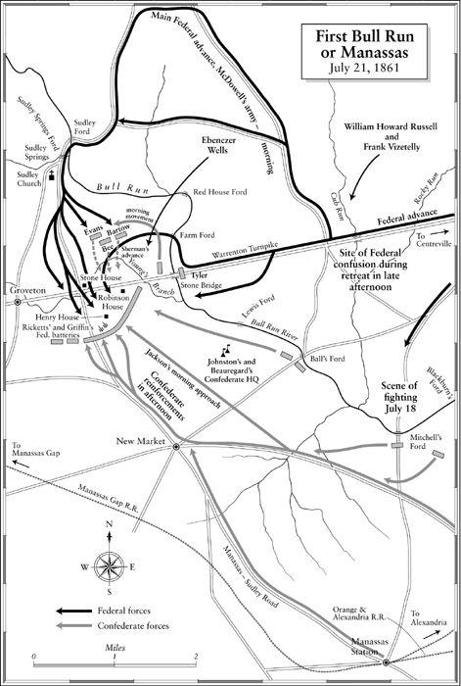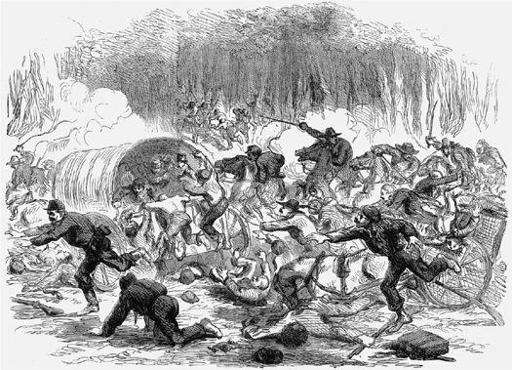A World on Fire: Britain's Crucial Role in the American Civil War (28 page)
Read A World on Fire: Britain's Crucial Role in the American Civil War Online
Authors: Amanda Foreman
Tags: #Europe, #International Relations, #Modern, #General, #United States, #Great Britain, #Public Opinion, #Political Science, #Civil War Period (1850-1877), #19th Century, #History


Map.7
First Bull Run or Manassas, July 21, 1861
Click
here
to view a larger image.
The sudden increase of firepower caught the Federal soldiers at the bottom of Henry House Hill by surprise. While Sherman was preparing his regiments to make a charge, some of the men threw themselves flat on the ground as others sought refuge behind trees. Sherman urged them to stay in formation. It was useless, he shouted, to duck after the explosions. Just then there was a loud bang above his head, causing him to duck involuntarily. “Well, boys,” said Sherman with a grin, “you may dodge the big ones.”
69
The 79th was the second regiment to make the attempt. “We were met by a terrible raking fire,” recalled one of the survivors, “against which we could only stagger.”
70
A second assault with the same result convinced the survivors that it was time to retreat. By the time the Highlanders had reached the safety of the river, they had suffered 198 casualties, including their colonel and half the regiment’s officers.
The field was littered with bodies when Sherman ordered the 69th to make their charge. By now it was late afternoon and many Union soldiers had reached the end of their strength. Sensing his enemies’ exhaustion, in one of his few sensible decisions that day, General Beauregard ordered the Confederates to make a countercharge. The rebels surged forward, letting out wild, whooping screams as they ran. The “rebel yell,” as it became known, froze the Union soldiers in their tracks. Just as Colonel Corcoran shouted to his men to rally to the flag, two other Federal regiments on the hill smashed into them, pursued by Confederate cavalry.
The urge to flee spread to other parts of McDowell’s army. Russell had ridden down to the turnpike bridge and was about to cross it when he saw a mob running toward him. The Union retreat had turned into a mass rout. “The crowd from the front continually increased,” he wrote; “the heat, the uproar, and the dust were beyond description. I got up out of the road and into a cornfield, through which men were hastily walking or running, their faces streaming with perspiration, and generally without arms.”
71
Vizetelly was riding to Centreville to hand over another set of drawings to a waiting courier when he was forced off the road by a roaring cavalcade of horses and wagons. He turned around and saw a dense cloud, thick and impenetrable like an explosion, hurtling toward him. He quickly joined the churning sea of humanity to avoid being trampled. Soldiers and spectators became tangled in a bloody struggle to escape.
Ebenezer Wells was not far behind. “I had been detached into the transportation department, having volunteered for such, and was on my way to the front,” he wrote.
When an officer met me and ordered me to turn back saying the troops were retreating, I answered I dare not accept any orders but from Headquarters, as I had ammunition. He drew his revolver threatening to shoot me if I disobeyed.… I went on but soon found it was too true. The Army was on the retreat, and after having had a view of some of the renowned Southern Black Horse Cavalry I turned and joined in the run. And it was indeed a run, some never stopped until they reached New York. We lost more men then by desertion than all the rest of the war put together.
72
Russell also became part of the flight. “What occurred at the hill I cannot say,” he wrote, “but all the road from Centreville for miles presented such a sight as can only be witnessed in the track of the runaways of an utterly demoralised army.” He asked one soldier why he was running. “ ‘I am not afraid of you,’ replied the ruffian, levelling his piece at me and pulling the trigger. It was not loaded or the cap was not on, for the gun did not go off.”
73
Shaken, Russell concentrated on surviving the ride home. It was almost midnight when he reached his lodgings. Lightning played about the sky. Russell shut the door and sat down at his desk, intending to write his report before daybreak. A messenger arrived from Lord Lyons, who had become alarmed after Warre returned to Washington without him. Russell scribbled a quick note in reply, then returned to his report. But after a few minutes of writing, his pen slipped and he slumped in his chair. “I awoke from a deep sleep this morning, about six o’clock,” he wrote.

Ill.8
The stampede from Bull Run, by Frank Vizetelly.
The rain was falling in torrents and beat with a dull, thudding sound on the leads outside my window; but louder than all, came a strange sound, as if of the thread of men, a confused tramp and splashing, and a murmuring of voices. I got up and ran to the front room.… I saw a steady stream of men covered with mud, soaked through with rain, who were pouring irregularly, without any semblance of order up Pennsylvania Avenue towards the Capitol.
74
Russell stayed at his desk all day, occasionally pausing to watch McDowell’s dejected army stumble past his window. Hundreds of prisoners, including Colonel Corcoran of the 69th, remained at Manassas. Mary Sophia Hill caught a glimpse of them whenever she ran between hospital tents. She had been working without a rest since the morning of the battle. “They have not half the supplies,” she wrote. “I tore down all the window blinds, and rolled them into bandages.” She cleaned, bandaged, fed, and comforted scores of wounded soldiers, all of whom reminded her of Sam. Some of the men begged for water, others pleaded with her to remove bullets from their shattered limbs. “I heard and saw it all,” she recorded, “war in its grandeur and war in its meanness.”
75
Only later did she learn that Sam’s regiment never actually fired a shot.
5.1
The Confederate flag changed several times; for the moment it sported nine stars in a circle inside a blue square next to three bars of red and white.
5.2
At the beginning of the war, a Confederate regiment generally consisted of 1,100 officers and men divided into ten companies.
5.3
Elizabeth Blackwell (1821–1910) was not only the first woman to earn a medical degree in the United States, but also the first female doctor to be placed on the British General Medical Council’s register. Born in England and having lived and studied in both countries, she was the quintessential British American, having lived and studied in both countries, though “I look upon England as my home, and must always do so,” she wrote to her best friend, the feminist writer Barbara Bodichon in 1860. Dr. Blackwell had been unable to raise sufficient funds to start a medical school for women in London, but since 1853 had been running the New York Infirmary for Indigent Women and Children, where her aim was to train women to become doctors in the course of serving the poor. The novelist George Eliot met Elizabeth Blackwell in 1859, recording in her diary: “Esteemable for the courage and perseverance she has shown … but very repulsive and schoolmistress-like in manner.”
5.4
Nineteen-year-old Thomas Beach, for example, was working for a British bank in Paris when the war began. “Friends and associations, many of them American, were leaving on every hand for the seat of war,” he wrote. As a lark, Beach decided to go along with a group of friends who were sailing for New York. They all joined the same regiment: “Regarding the whole proceeding more in the light of a good joke than anything else, [I called] myself Henri Le Caron.” (Under this name, during the 1870s he became one of the most notorious and successful spies in the British Secret Service.)
27
5.5
The original Zouaves were an elite North African corps in the French army whose uniform of white leggings, baggy blue trousers, magenta jacket, and bright red fez made them unmistakable on the battlefield. A Chicago lawyer named Elmer Ellsworth had started the American craze for Zouave regiments in 1859. He formed his own outfit, trained the men in the complicated drills and swordplay of a Zouave regiment, and took them on a nineteen-city tour of America. Colonel Hawkins had seen a demonstration by Ellsworth’s Zouaves the previous summer, which was all the encouragement he needed to organize a New York version. His small company of Zouaves was among the first to be granted permission to recruit a full regiment, hence its designation as the 9th New York Volunteer Infantry.
5.6
A regiment was composed of around a thousand officers and men divided into ten companies; a brigade generally consisted of four to six regiments; and a division normally had three or four brigades. In theory, a division contained twelve thousand men.
5.7
The effective range of a smoothbore was about 100 yards, compared to the more deadly and accurate 1861 Springfield, which had a range of 300 yards.
SIX
War by Other Means
McClellan takes charge—Prince Napoleon at the White House—Sanford’s spies—Desperate for arms—The British join up—The raging storm
F
rank Vizetelly diplomatically skimmed over the Federal rout in his dispatch for the
Illustrated London News;
William Howard Russell could describe little else, since it was the only part of the battle he had actually witnessed. Knowing how dreadful it would sound, he was careful not to condemn the soldiers for the mistakes of their leaders. “The men were overworked,” Russell explained in his report, “kept out for 12 or 14 hours in the sun exposed to long-range fire, badly officered, and of deficient regimental organization.” The army’s lack of experience, he added, made an orderly retreat all but impossible.
1
Russell also blamed the generals for the subsequent mayhem in the capital; Washington was held hostage for two days while drunken soldiers roamed the city. “The Secretary of War knows not what to do, Mr. Lincoln is equally helpless,” Russell recorded. “There is no provost guard, no patrol, no authority visible in the streets.”
2
He wondered why the Confederates did not simply march in and take the city while it lay helpless and disorganized. The French minister agreed with him. “Ever since I first met M. Mercier,” wrote Russell, “he has expressed his conviction that the North never can succeed in conquering the South, or even restoring the Union.” Mercier felt the South might have lost more men in the Battle of Bull Run than it was publicly admitting. Nothing else, he thought, could explain the Confederacy’s failure to exploit the chaos of the Federal army.
Rose Greenhow sent messages to General Beauregard urging him to strike while the city was undefended: “Come on! Why do you not come?” she pleaded.
3
Beauregard did not come because his forces were almost as disorganized as the defeated Federals. The problem of supplies was as acute as ever, his men were exhausted, and he knew that McDowell’s army had not been destroyed at Manassas (as the Confederates called the battle)—it had simply run away.
6.1
But Southern public opinion agreed with Rose Greenhow. Newspapers voiced anger toward Beauregard for not finishing the task, but also expressed overweening confidence, even exultation, in the superiority of the Confederate army. The light number of casualties at Manassas contributed to the belief that the war would soon be over with little cost to the South.
4